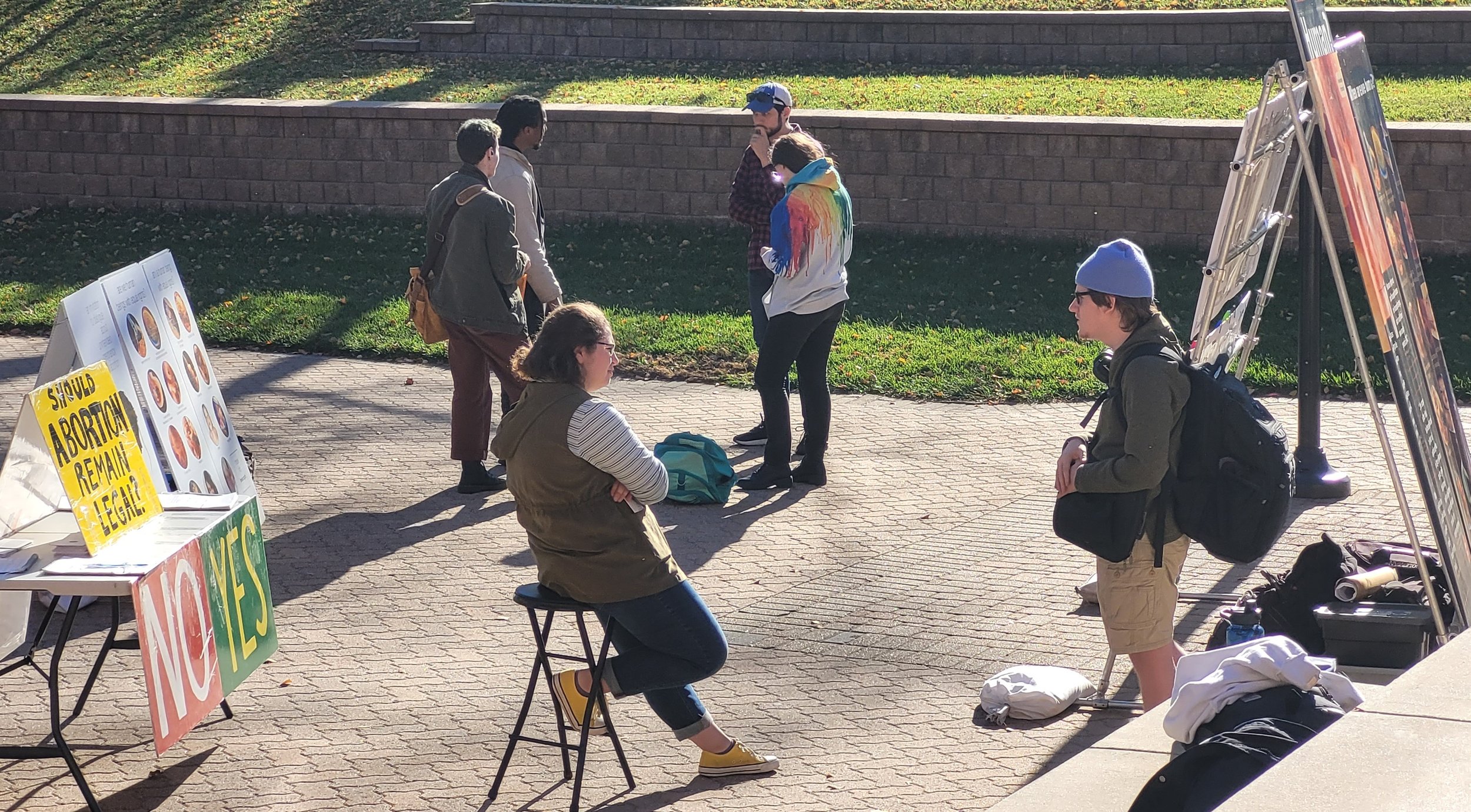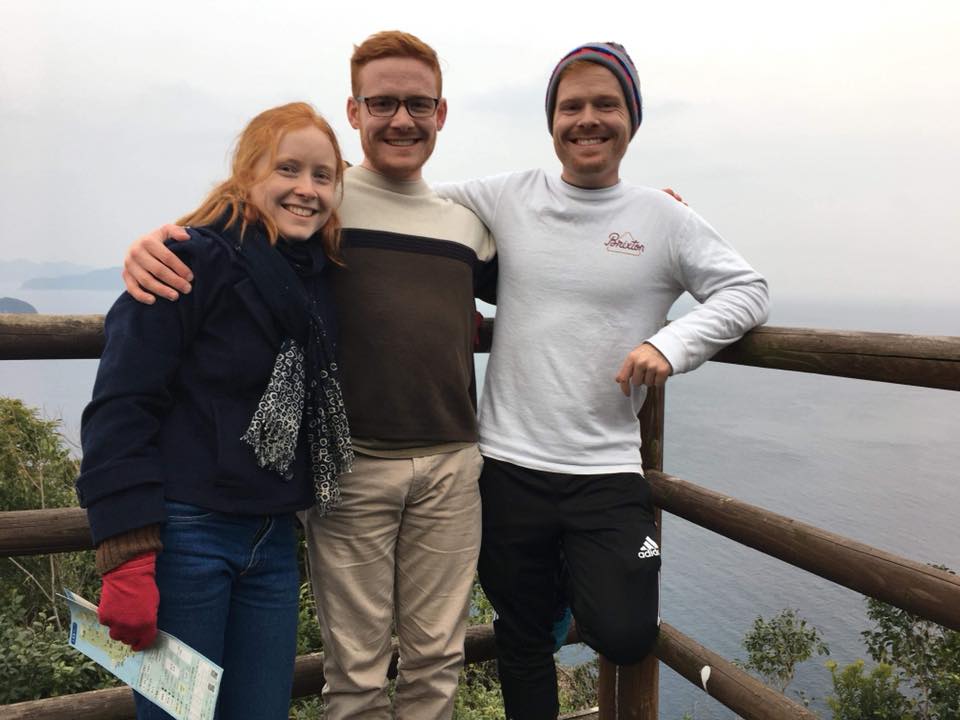With Dobbs returning abortion policy back to the states and consequently back to the people, pro-life advocates need to actively engage others in dialogue, perhaps now more than ever. In a “Classic Reprint” of a 2012 letter we sent to supporters this month, Joanna Bai illustrates how to listen to understand, make careful distinctions, and challenge people in a gentle way that helps them think more clearly. She also models the humble spirit we at JFA aim to bring to all of our work, being willing to say, “I was mistaken.” It can’t be overstated how important this is to help people feel free to adopt that same humble spirit. “Humble” is one of ten character qualities described in the Ambassador’s Creed from Stand to Reason. Our team reviews this excellent list every year as a reminder, and we heartily recommend it. - Steve Wagner, Executive Director
A large group was forming around JFA volunteer Lori Navrodtzke as she spoke with a student named “Julie” at our University of Kansas (KU) outreach last month [September 2012]. Intrigued, I also listened in.
Julie seemed opposed to our attempts to change people’s views about the morality of abortion because she believed that morals are relative. She explained that society sets moral standards based on what it thinks is beneficial for people. I requested permission to ask a clarifying question.
Joanna: From the little I’ve heard of your conversation, it sounds to me like you’ve asserted that we [at JFA] are wrong to impose our standard of morality on others. Is that correct?
Julie: Yes. That is what I meant.
Joanna: If you make that assertion, isn’t that action [of asserting that JFA is wrong] imposing your standard of morality on us? Your view does not seem to line up with itself.
In other words, her claim seemed to be self-refuting. She then agreed there was a problem in her claim, but only as I had presented it.
As she clarified her position, I saw that I had equivocated on her use of the term “wrong.” Perhaps she didn’t mean that it is unjust (morally wrong) to make a moral claim about abortion. Perhaps she really meant that we were mistaken (logically wrong) in claiming that there is any such thing as objective moral truth.
“Maybe she isn’t making a moral claim at all,” I thought. What she said next confirmed this:
Julie: You can say whatever you want about your beliefs, but those beliefs don’t make it bad for someone else to do something contrary to them.
Sensing that I had been missing her intent, I asked another clarifying question.
Joanna: Do you reject the idea of objective truth in general, or do you only reject the idea of objective moral truth specifically?
Julie: I only reject the idea of objective moral truth.
Clarifying this was extremely helpful to our conversation. In doing so, I realized she actually believed in truth and falsehood – just not truth and falsehood regarding moral claims. She believed there are such things as false beliefs, and she believed that one of my false beliefs was that there are objective moral wrongs (such as abortion). In other words, she believed there is an objective truth that morality is subjective.
She continued to clarify her thoughts.
Julie: I do believe in objective truth. Truth is that which can be proven empirically.
Now we were getting somewhere. She believed that truth is only that which is empirically proven (observed using the five senses). While my concern about self-refutation missed the mark with her previous statement, it was clearly appropriate now. I attempted to help her see the problem.
Joanna: Julie, can you empirically prove the statement you just made?
(In other words, “Can your statement hold to its own standard?”) Her statement about empirical proof would have to be proved by philosophical means, not empirical – but the statement itself didn’t leave room for any philosophical statements to be taken seriously!
This conversation clarified a number of things for me. First, while the denial of objective truth is self-refuting, the denial of moral truth is not necessarily self-refuting. Sure, if Julie had meant, “It is morally wrong to say any action is morally wrong,” that claim would have been self-refuting because the act of making the claim would violate the meaning of the claim itself. But Julie didn’t make that claim. By using the word “wrong,” she made it possible for me to confuse her meaning. She had actually meant that we were “mistaken” rather than morally wrong.
“We need to be careful to try to understand what people mean before we accuse them of holding contradictory points of view.”
As it turned out, Julie did have a view that was self-refuting – the very common claim that truth is only that which can be empirically proven. That’s a claim that can’t live by its own rules. So, unlike the claim, “You’re wrong (incorrect) to think there are moral rules,” (which is false for other reasons), this claim, “Truth is only that which can be proven empirically,” actually is self-refuting because one can’t know that the statement itself is true through empirical means. If the statement is true, then it is also false. Now, that’s a problem!
In talking with Julie, I experienced the importance of “listening to reflect,” rather than “listening simply to refute.” We need to be careful to try to understand what people mean before we accuse them of holding contradictory points of view. When I asserted that Julie’s initial claim was self-refuting, I was assuming I understood what she meant by “wrong.” When I stepped back and listened more carefully, it became clear I had misunderstood her. This further listening proved to be providential. By listening to understand her view clearly, I was able to ask better questions, which put us on the path of finding truth together.
Joanna Bai served as a JFA trainer from 2012-2022. This story was originally published in Joanna Bai’s October 2012 newsletter (“Which Kind of ‘Wrong’ Is ‘Right’ - How a Conversation at KU Taught Me to Listen”). See also Joanna’s “One Central Question Helps Change a Mind” which we featured in March of this year. Read many other excellent letters by Joanna and other alumni trainers JFA has had the privilege to employ over the years at the link below.
Featured Image (Steve Wagner): Walkway near the Governor’s Palace at Colonial Williamsburg, Virginia.







